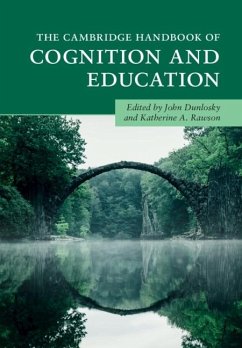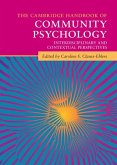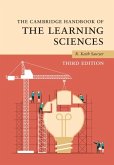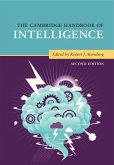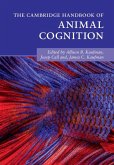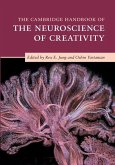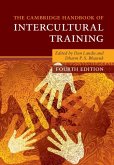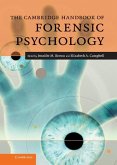Cambridge Handbook of Cognition and Education (eBook, ePUB)
Redaktion: Dunlosky, John


Alle Infos zum eBook verschenken

Cambridge Handbook of Cognition and Education (eBook, ePUB)
Redaktion: Dunlosky, John
- Format: ePub
- Merkliste
- Auf die Merkliste
- Bewerten Bewerten
- Teilen
- Produkt teilen
- Produkterinnerung
- Produkterinnerung

Hier können Sie sich einloggen

Bitte loggen Sie sich zunächst in Ihr Kundenkonto ein oder registrieren Sie sich bei bücher.de, um das eBook-Abo tolino select nutzen zu können.
This Handbook reviews a wealth of research in cognitive and educational psychology that investigates how to enhance learning and instruction to aid students struggling to learn and to advise teachers on how best to support student learning. The Handbook includes features that inform readers about how to improve instruction and student achievement based on scientific evidence across different domains, including science, mathematics, reading and writing. Each chapter supplies a description of the learning goal, a balanced presentation of the current evidence about the efficacy of various…mehr
- Geräte: eReader
- mit Kopierschutz
- eBook Hilfe
- Größe: 14.97MB
- FamilySharing(5)
![Cambridge Handbook of Community Psychology (eBook, ePUB) Cambridge Handbook of Community Psychology (eBook, ePUB)]() Cambridge Handbook of Community Psychology (eBook, ePUB)35,95 €
Cambridge Handbook of Community Psychology (eBook, ePUB)35,95 €![Cambridge Handbook of the Learning Sciences (eBook, ePUB) Cambridge Handbook of the Learning Sciences (eBook, ePUB)]() Cambridge Handbook of the Learning Sciences (eBook, ePUB)43,95 €
Cambridge Handbook of the Learning Sciences (eBook, ePUB)43,95 €![Cambridge Handbook of Intelligence (eBook, ePUB) Cambridge Handbook of Intelligence (eBook, ePUB)]() Cambridge Handbook of Intelligence (eBook, ePUB)74,95 €
Cambridge Handbook of Intelligence (eBook, ePUB)74,95 €![Cambridge Handbook of Animal Cognition (eBook, ePUB) Cambridge Handbook of Animal Cognition (eBook, ePUB)]() Cambridge Handbook of Animal Cognition (eBook, ePUB)62,95 €
Cambridge Handbook of Animal Cognition (eBook, ePUB)62,95 €![Cambridge Handbook of the Neuroscience of Creativity (eBook, ePUB) Cambridge Handbook of the Neuroscience of Creativity (eBook, ePUB)]() Cambridge Handbook of the Neuroscience of Creativity (eBook, ePUB)35,95 €
Cambridge Handbook of the Neuroscience of Creativity (eBook, ePUB)35,95 €![Cambridge Handbook of Intercultural Training (eBook, ePUB) Cambridge Handbook of Intercultural Training (eBook, ePUB)]() Cambridge Handbook of Intercultural Training (eBook, ePUB)35,95 €
Cambridge Handbook of Intercultural Training (eBook, ePUB)35,95 €![Cambridge Handbook of Forensic Psychology (eBook, ePUB) Cambridge Handbook of Forensic Psychology (eBook, ePUB)]() Cambridge Handbook of Forensic Psychology (eBook, ePUB)52,95 €
Cambridge Handbook of Forensic Psychology (eBook, ePUB)52,95 €-
-
-
Dieser Download kann aus rechtlichen Gründen nur mit Rechnungsadresse in A, B, BG, CY, CZ, D, DK, EW, E, FIN, F, GR, HR, H, IRL, I, LT, L, LR, M, NL, PL, P, R, S, SLO, SK ausgeliefert werden.
- Produktdetails
- Verlag: Cambridge University Press
- Erscheinungstermin: 7. Februar 2019
- Englisch
- ISBN-13: 9781108245104
- Artikelnr.: 57076042
- Verlag: Cambridge University Press
- Erscheinungstermin: 7. Februar 2019
- Englisch
- ISBN-13: 9781108245104
- Artikelnr.: 57076042
- Herstellerkennzeichnung Die Herstellerinformationen sind derzeit nicht verfügbar.
overview of The Cambridge Handbook of Cognition and Education John Dunlosky
and Katherine A. Rawson; Part I. Foundations: 1. How the learning sciences
can inform cognitive psychology Keith Sawyer and John Dunlosky; 2. Quackery
in educational research Daniel H. Robinson and Joel R. Levin; Part II.
Science and Math: 3. Teaching critical thinking as if our future depends on
it, because it does Diane F. Halpern and Heather A. Butler; 4. Improving
students' scientific thinking David Klahr, Corinne Zimmerman and Bryan J.
Matlen; 5. Spatial skills, reasoning, and mathematics Nora S. Newcombe,
Julie L. Booth and Elizabeth Gunderson; 6. Iterative development of
conceptual and procedural knowledge in mathematics learning and instruction
Bethany Rittle-Johnson; 7. Development of fraction understanding Pooja G.
Sidney, Clarissa A. Thompson and John E. Opfer; 8. Learning how to solve
problems by studying examples Tamara van Gog, Nikol Rummel and Alexander
Renkl; 9. Harnessing our hands to teach mathematics: how gesture can be
used as a teaching tool in the classroom Elizabeth M. Wakefield and Susan
Goldin-Meadow; Part III. Reading and Writing: 10. Fundamental components of
reading comprehension Anne E. Cook and Edward J. O'Brien; 11. Writing as a
learning activity Perry D. Klein and Aartje van Dijk; 12. Bilingualism and
education: connecting cognitive science research to language learning Gigi
Luk and Judith F. Kroll; 13. Note-taking Stephen T. Peverly and Amie D.
Wolf; 14. Multiple text comprehension Jean-François Rouet, M. Anne Britt
and Anna Potocki; 15. Interventions to promote reading for understanding:
current evidence and future directions Elizabeth A. Stevens and Sharon
Vaughn; Part IV. General Learning Strategies: 16. When does interleaving
practice improve learning? Paulo F. Carvalho and Robert L. Goldstone; 17.
Correcting student errors and misconceptions Elizabeth J. Marsh and
Emmaline E. Drew; 18. How multimedia can improve learning and instruction
Richard E. Mayer; 19. Multiple-choice and short-answer quizzing on equal
footing in the classroom: potential indirect effects of testing Mark A.
McDaniel and Jeri L. Little; 20. Collaborative learning: the benefits and
costs Timothy J. Nokes-Malach, Cristina D. Zepeda, Elizabeth Richey and
Soniya Gadgil; 21. Self-explaining: learning about principles and their
application Alexander Renkl and Alexander Eitel; 22. Enhancing the quality
of student learning using distributed practice Melody Wiseheart, Carolina
E. Küpper-Tetzel, Tina Weston, Alice S. N. Kim, Irina V. Kapler and Vanessa
Foot; Part V. Metacognition: 23. Self-regulation in computer-assisted
learning systems Roger Azevedo, Nicholas V. Mudrick, Michelle Taub and
Amanda E. Bradbury; 24. Improving students' metacomprehension accuracy
Thomas D. Griffin, Marta K. Mielicki and Jennifer Wiley; 25. Calibration
and self-regulated learning: making the connections Douglas J. Hacker and
Linda Bol; 26. Teachers' judgments of student learning of mathematics Keith
W. Thiede, Steven Oswalt, Jonathan L. Brendefur, Michele B. Carney and
Richard D. Osguthorpe; 27. Learning strategies and self-regulated learning
Philip H. Winne and Zahia Marzouk.
overview of The Cambridge Handbook of Cognition and Education John Dunlosky
and Katherine A. Rawson; Part I. Foundations: 1. How the learning sciences
can inform cognitive psychology Keith Sawyer and John Dunlosky; 2. Quackery
in educational research Daniel H. Robinson and Joel R. Levin; Part II.
Science and Math: 3. Teaching critical thinking as if our future depends on
it, because it does Diane F. Halpern and Heather A. Butler; 4. Improving
students' scientific thinking David Klahr, Corinne Zimmerman and Bryan J.
Matlen; 5. Spatial skills, reasoning, and mathematics Nora S. Newcombe,
Julie L. Booth and Elizabeth Gunderson; 6. Iterative development of
conceptual and procedural knowledge in mathematics learning and instruction
Bethany Rittle-Johnson; 7. Development of fraction understanding Pooja G.
Sidney, Clarissa A. Thompson and John E. Opfer; 8. Learning how to solve
problems by studying examples Tamara van Gog, Nikol Rummel and Alexander
Renkl; 9. Harnessing our hands to teach mathematics: how gesture can be
used as a teaching tool in the classroom Elizabeth M. Wakefield and Susan
Goldin-Meadow; Part III. Reading and Writing: 10. Fundamental components of
reading comprehension Anne E. Cook and Edward J. O'Brien; 11. Writing as a
learning activity Perry D. Klein and Aartje van Dijk; 12. Bilingualism and
education: connecting cognitive science research to language learning Gigi
Luk and Judith F. Kroll; 13. Note-taking Stephen T. Peverly and Amie D.
Wolf; 14. Multiple text comprehension Jean-François Rouet, M. Anne Britt
and Anna Potocki; 15. Interventions to promote reading for understanding:
current evidence and future directions Elizabeth A. Stevens and Sharon
Vaughn; Part IV. General Learning Strategies: 16. When does interleaving
practice improve learning? Paulo F. Carvalho and Robert L. Goldstone; 17.
Correcting student errors and misconceptions Elizabeth J. Marsh and
Emmaline E. Drew; 18. How multimedia can improve learning and instruction
Richard E. Mayer; 19. Multiple-choice and short-answer quizzing on equal
footing in the classroom: potential indirect effects of testing Mark A.
McDaniel and Jeri L. Little; 20. Collaborative learning: the benefits and
costs Timothy J. Nokes-Malach, Cristina D. Zepeda, Elizabeth Richey and
Soniya Gadgil; 21. Self-explaining: learning about principles and their
application Alexander Renkl and Alexander Eitel; 22. Enhancing the quality
of student learning using distributed practice Melody Wiseheart, Carolina
E. Küpper-Tetzel, Tina Weston, Alice S. N. Kim, Irina V. Kapler and Vanessa
Foot; Part V. Metacognition: 23. Self-regulation in computer-assisted
learning systems Roger Azevedo, Nicholas V. Mudrick, Michelle Taub and
Amanda E. Bradbury; 24. Improving students' metacomprehension accuracy
Thomas D. Griffin, Marta K. Mielicki and Jennifer Wiley; 25. Calibration
and self-regulated learning: making the connections Douglas J. Hacker and
Linda Bol; 26. Teachers' judgments of student learning of mathematics Keith
W. Thiede, Steven Oswalt, Jonathan L. Brendefur, Michele B. Carney and
Richard D. Osguthorpe; 27. Learning strategies and self-regulated learning
Philip H. Winne and Zahia Marzouk.
